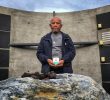Cimatu was the government official in charge of evacuating the OFWs in Iraq during the invasion in 2003. The Overseas Workers Welfare Administration (OWWA) released $293,500 to Cimatu supposedly for a massive evacuation from Iraq and another P5 million ($104,373.24) for the 51-man humanitarian contingent sent to the war-torn country. But Migrante International chairperson Connie Bragas-Regalado said that there has been �no passable auditing report (from) Cimatu� about this project.
Instead, he said he only learned of Cimatu�s presence when he was still in Kuwait. �Nakita ko si Cimatu, wala lang, nagpamigay ng leaflets, mag-imbak na daw kami ng pagkain, wag lalabas� (I saw Cimatu simply distributing leaflets, telling us to store food and not to go out).
For their own protection, workers inside the military camps are issued with access badges with security bar codes by the U.S. government.
With this badge, they can freely move in unrestricted areas inside the camp without a soldier escort. Sanchez said the badge is as important as their life. There are incidents, he said, that the US soldiers would fire on suspected suicide bombers, mostly Arab-looking men and children, if those suspects continue to move despite soldiers� order to stop walking.
Sanchez would work from 8 a.m. to 5 p.m. in their burger post. Afterwards, they would spend the rest of the day in the recreation hall since no one could go out from the camp. Aside from sports, recreation also includes a free cinema viewing with free popcorns.
When no bus is available to transport them from one place to another inside the camp, Sanchez and friends would walk from their tent to the mess hall � a distance similar to that from Alabang, Muntinlupa City to San Pedro, Laguna or a 20-minute trip by jeepney or car.
�Pagpunta namin gutom na gutom na kami, pagbalik namin sa tent, gutom na ulit kami� (By the time we get to the mess hall we would be very hungry, by the time we get back to the tent we would be hungry again), he said, adding that they also walk about three kilometers from their tent to their burger stall.
Everything in the mess hall is free of charge. They could eat as much fruits they could take, milk or energy drink.
They could also buy other needs in a grocery inside the camp. Sanchez�s company gives them an allowance of $10 a week.
While in their post in Taji, Sanchez again noticed another misdeed by his co-employees. He said that a Lebanese would reprint receipts of customers. Thinking he was on the right side, he complained to the supervisor only to learn there was a �Mafia� in their group. He was sent back to Kuwait and given a 15-hour duty without overtime pay.
Because of a traumatic experience in Saudi also involving money, he resigned from the company and went back to the Philippines in 2004.
Social cost
At home, sad news was waiting for him. His wife had left him, bringing along their two children.
��Yun y�ung consequence ng pag-abroad, pagbalik mo broken family na� (That�s the consequence of working abroad, when you come back your family�s broken), he said.
He also learned that he was left with no money. When he was about to pay the bills for his hospitalization, only P2,000 ($41.75) was left in their bank account.
Their house was erected on his brother�s land. His wife bought a small lot but it was located near his mother-in-law�s lot in Rizal.
Recently, Sanchez tried his luck in Qatar as a supervisor in a restaurant there. He was promised a $400 basic pay for eight hours of work and another $200 for four hours of overtime work.
Initially, he does not want to return to Iraq anymore primarily because of the danger confronting them at the military camp. �Kung dodoblehin ulit (ang) sweldo, kung may opportunity, babalik talaga ako ulit �dun kasi nandun ang pera, di mo kayang kitain dito yun� (If they would double our salaries again, if there�s an opportunity, I would really go back there because the money�s there, you can�t earn that kind of money here), he explained.
Pinoy Life Abroad









